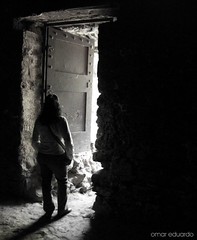Last week I posted some thoughts on grief. It wasn’t meant to be a systematic or comprehensive treatment of the topic, just some travelling meditations. I ended with a series of questions that were really a set of variations upon the primary psalmic question: How long O Lord? (Psalm 13); a question about time and expectations that seems to me to capture the canonical experience of grief.
 Only a Christian can grieve this way, with these sorts of questions, addressed to this Lord. Any kind of human can form expectations of the world. God has created a world, and created us for a world, that is purposeful. The triune God in his tripersonal creativity, has made a world directed towards particular goals, and this fact about the world is reflected in its temporal and causal order. We have Time because the Father wills that there be history. We have history because it is God’s purpose to bring all things in heaven and on earth under one head, Jesus Christ. Whether or not the Spirit has gifted any particular person with the ability to recognise this ultimate horizon, it is that case that the structure of time and created reality – derived from this ultimate purposiveness – is such that it leads humans to be ‘expectation-forming’ creatures. But Christians do not simply have a general ‘expectiveness’. We have expectations of God.
Only a Christian can grieve this way, with these sorts of questions, addressed to this Lord. Any kind of human can form expectations of the world. God has created a world, and created us for a world, that is purposeful. The triune God in his tripersonal creativity, has made a world directed towards particular goals, and this fact about the world is reflected in its temporal and causal order. We have Time because the Father wills that there be history. We have history because it is God’s purpose to bring all things in heaven and on earth under one head, Jesus Christ. Whether or not the Spirit has gifted any particular person with the ability to recognise this ultimate horizon, it is that case that the structure of time and created reality – derived from this ultimate purposiveness – is such that it leads humans to be ‘expectation-forming’ creatures. But Christians do not simply have a general ‘expectiveness’. We have expectations of God.
Expectation is a mark of God’s elect people. It is a work of the Holy Spirit to make God’s people supernaturally expective. It is the properly human virtue which responds to divine faithfulness. If God’s sovereignty is most characteristically expressed in the speech-act of promising, the most genuinely human response to God’s sovereignty is expecting. Not resignation, not fatalism, expectation. (I suspect that you can detect versions of bad theology of divine sovereignty using this test). The Old Testament saints testify to this time after time. I can’t do more than point you to Hebrews 11. You’ll notice that the major qualification to have your portrait hung in this Old Testament Hall of Fame is expectation. Divine, supernaturally induced expectation.
And the other characteristic of all these saints was their disappointment. They all died expecting. God is not ashamed of the disappointed.
All these people were still living by faith when they died. They did not receive the things promised; they only saw them and welcomed them from a distance. And they admitted that they were aliens and strangers on earth. People who say such things show that they are looking for a country of their own. If they had been thinking of the country they had left, they would have had opportunity to return. Instead, they were longing for a better country—a heavenly one. Therefore God is not ashamed to be called their God, for he has prepared a city for them. (Hebrews 11:13–16 NIV)
It is from this bedrock understanding of divine promising and human expectation that we can begin to feel our way towards understanding godly disappointment, how to grieve righteously.
More thoughts to come…